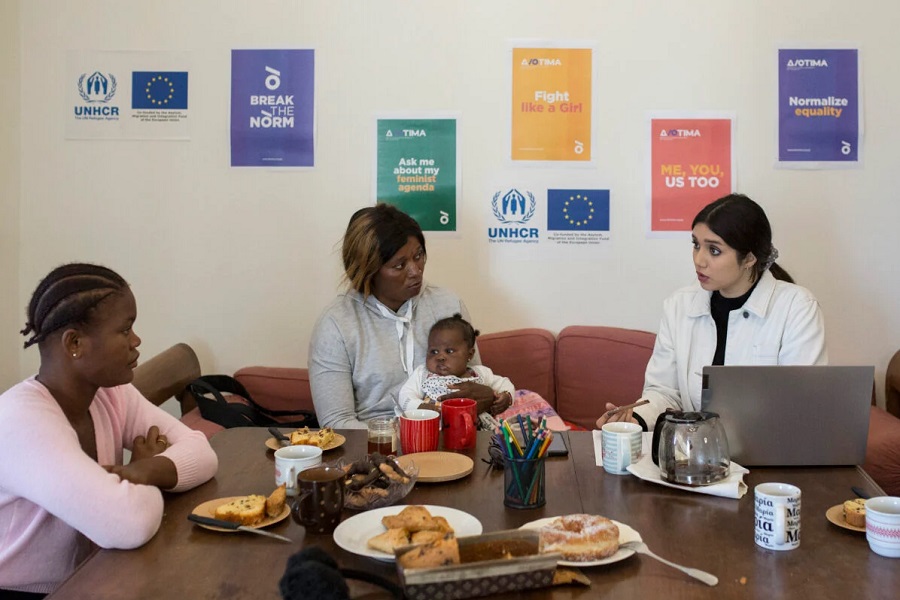Inside a traditional house on the island of Lesvos in Greece, Shirin pours hot coffee and places a freshly baked cake on the table. She is creating a welcoming environment at the “Women’s Info Point”, a safe space for refugee women, where she holds regular sessions to raise awareness and discuss issues of gender-based violence.
Shirin is from Iran and has been living on Lesvos for the last few years. She now works as a Gender-Based Violence Prevention Officer at the non-profit Centre of Research on Women’s Issues, “Diotima”, a partner of UNHCR, the UN Refugee Agency.
She is part of a larger team of refugee and migrant women, who are the connecting link between the organization and the refugee communities. They work to prevent and address gender-based violence by providing information and empowering single and vulnerable women who reside in Lesvos’ Closed Controlled Facility.
Fatmata, Hawanatu and Memunatu, three refugee women from Sierra Leone and gender-based violence survivors, are attending today’s session. They say they feel at home here. The session rolls out in a friendly environment, which helps build trust and create a sense of security. Shirin uses interactive presentations, open questions and personal stories to explain gender equality and human rights.
In many cultures, discussing gender and sexual issues is often considered a taboo. Diotima Centre works hard to tear down such stereotypes and help gender-based violence survivors speak up about their past experiences.
One of the main topics they touch upon in these sessions, is the different forms of violence. Shirin explains that physical abuse is not the only form that women should be aware of and report. There are also other types of abuse, sometimes less visible, such as psychological abuse and financial manipulation.
“Even if someone has the intention to harm you, they are committing an act of violence“, she tells the three women.
Women are also interested to know how they can report an act of violence. At the same time, however, they sound anxious about the consequences they might face from reporting a perpetrator. Shirin eases their concerns and reassures them that all cases are treated with respect and confidentiality throughout.
Viviana Koukou, Regional Coordinator of Diotima Centre on Lesvos, describes how hard it is for women to realize that the incidents they have experienced were actually forms of gender-based violence.
“It is painful for a woman to realize that for 20 years she was in a marriage experiencing physical, psychological or emotional violence. She may mourn, express anger, disappointment or sadness. But then, the process becomes redemptive, liberating and the woman transforms her experience into strength“, Viviana says.
Shirin discloses how inspired and empowered she feels from the women she interacts with, when she sees “how strong they feel and how independent they become, as soon as they learn their rights and realize they are no longer alone“.
Fatmata attends the meeting with her three-month-old baby girl.
“Since I met the people of Diotima, my life has changed significantly. When I arrived in Greece and while I was pregnant, they gave me strength and hope“, says Fatmata with her voice exuding gratitude.
It is no coincidence, after all, that Fatmata has chosen to give her daughter the name of Diotima’s lawyer who supported her in the asylum procedure. With all the support she has received so far, Fatmata says that she now feels more confident and stronger to support her daughter.
The women’s info sessions are organized as part of the “Gender-Based Violence Prevention and Response” programme run by UNHCR in partnership with Diotima Centre and financial support from the European Union. The programme runs in Athens, Chios, Lesvos and Thessaloniki, providing holistic protection to gender-based violence survivors. In addition to empowering women, it seeks to advance women’s social inclusion and integration, combining free legal aid, with personalized psychosocial support and a robust referral mechanism.
Although the programme mainly focuses on refugee women, it also includes actions for refugee men, providing information and raising awareness about gender-based violence issues.
“Men in general accept the fact that they have gender stereotypes from childhood and are willing to listen. Older men usually think that violence is only physical, they don’t believe in emotional or financial violence. However, young men accept that there are other forms of violence too“, Shirin explains.
Just before the end of the meeting, Shirin says emphatically to Fatmata, Hawanatu and Memunatu: “You should believe in yourselves! You are the strongest women I have ever met and I am very proud of you“.
The women smile and Hawanatu uses three words to express what she has found in Greece: love, safety and attention.
“Now, I want to take care of myself and make a new start in my life“, she says in confidence.
* The 16 Days of Activism against Gender-Based Violence is an annual international campaign that kicks off on 25 November, the International Day for the Elimination of Violence against Women, and runs until 10 December, Human Rights Day.





